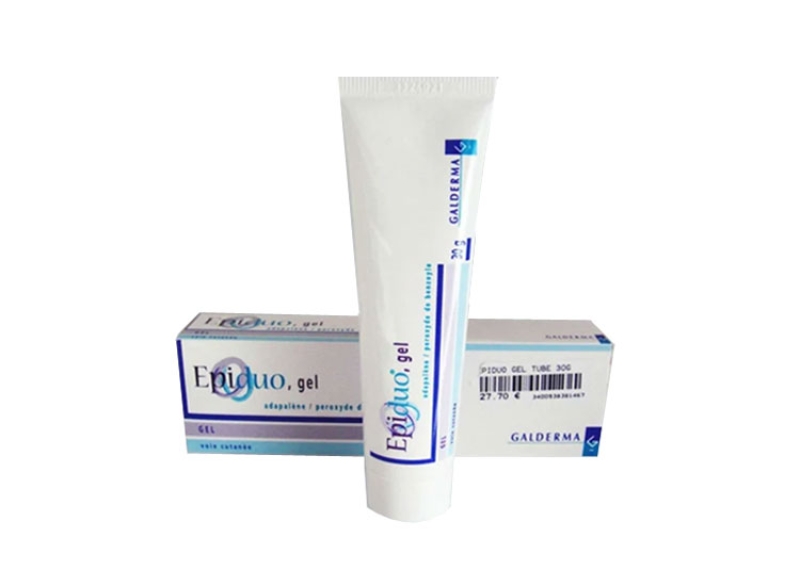Epiduo Gel

* Images for illustrative purposes only
* Brand supplied may vary depending on stock availability
Same-day Service Available
Same-day service available for additional £10, conditions apply.

* Images for illustrative purposes only
* Brand supplied may vary depending on stock availability
Same-day service available for additional £10, conditions apply.
No appointment or long waiting times
Your information always remains private
All our doctors & pharmacists are qualified & based in the UK
Dispensed by our UK partner pharmacies


Choose from our treatment options or speak to the in-store pharmacist for advice

Complete our free online medical consultation to be reviewed by our Clinical Team

We will notify you when your medication is ready for collection
Epiduo is a topical gel that is used in the treatment of moderate to severe acne. It contains two active ingredients; benzoyl peroxide and adapalene. These ingredients are both used to treat acne and they work in different ways.
Benzoyl Peroxide is an antimicrobial agent, it kills the bacteria that cause acne as well as softening and peeling the outer layer of skin, breaking down whiteheads and blackheads, and thereby reducing acne and inflammation across the affected area. Adapalene belongs to a group of medicines called retinoids; it helps to reduce inflammation and black and white head formation on the outer layer of the skin. Adapalene is an advanced third generation retinoid which exhibits many of the same effects as previous generation medicines like tretinoin but is often tolerated better.
As with all medicines applied to the skin in the treatment of acne, you may have to wait up to 4 weeks to start to see a change in your acne and that the Epiduo gel is working. Because of the combination of active ingredients Epiduo gel can help to manage the appearance of acne as well as prevent future outbreaks. It is important to be consistent in your application of this gel in order for it to work properly.
After removing any makeup and washing the face, a thin film of the gel should be applied to a clean and dry skin on the acne affected area once a day before going to bed. Wash your hands thoroughly after application as the gel can bleach fabrics and hair. Avoid any contact with the eyes, mouth, lips and nostrils and do not apply to broken skin. The gel will not work more effectively or any faster if it is applied more times than it is prescribed.
In the event you miss a dose, it is safe to apply the missed dose as soon as possible. However, if enough time has passed that you should be applying your next dose instead, simply skip the missed dose and resume your typical application schedule.
Always use this medication exactly as your clinician has told you. Check with our clinical team or your GP or pharmacist if you are not sure.
Medicines and their possible side effects can affect individual people in different ways. The following are some of the side effects that are known to be associated with this medicine. Just because a side effect is stated here, it does not mean that all people using this medicine will experience that or any side effect.
For full information on side effects and correct use, see the patient information leaflet. If any side effects concern you, or you are experiencing any of the side effects mentioned in the patient information leaflet whilst taking this medication, please contact our clinical team or speak to your GP.
Epiduo Gel should not be applied to skin that is broken or has eczema. It should not come into contact with the eyes, mouth, nostrils or mucous membranes. If the product enters the eye, wash immediately with warm water. Excessive exposure to sunlight or UV light (including sunbeds) should be avoided whilst using Epiduo.
Epiduo should not come into contact with any coloured material including hair and dyed fabrics as this may result in bleaching and discolouration.
Epiduo gel should not be used if you are pregnant or breastfeeding. It is only safe to be used by women who are sexually active if they are using an effective contraception.
Get emergency medical help if you have signs of an allergic reaction to this medication. These include:
It is important that you let us know which prescription, over-the-counter medicines and recreational drugs you are currently taking. You must also tell us about any other medical conditions that you currently have (or had in the past). This will help us ensure the prescribed medication is safe and appropriate for you to take.
For full information on warnings, medication interactions and contraindications, refer to the Patient Information Leaflet. Please read all packaging and the Patient Information Leaflet before taking any new medicine and inform our clinical team or your GP of medicines you are taking or intend to take.





